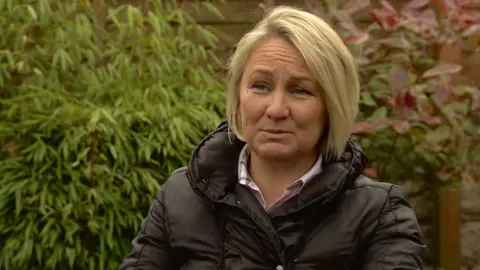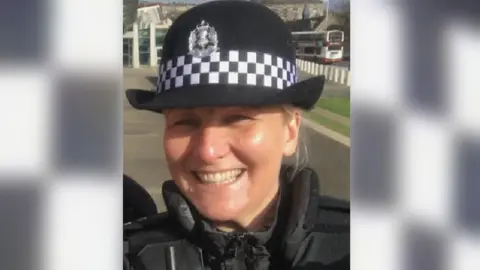Police Scotland 'tried to suppress' sexism claims
 BBC
BBCA former firearms officer, who claims she was discriminated against because she was a woman, says Police Scotland tried to suppress what happened to her.
Rhona Malone was told that two female officers should not be deployed together when there were men on duty.
She is taking legal action, claiming sex discrimination and victimisation.
Police Scotland said the case was due to be heard by an employment tribunal and it was the "appropriate forum" to discuss the matter.
Ms Malone, 44, from West Lothian, joined the police in 2009. Seven years later she successfully applied to become a firearms officer.
That meant passing the same tests and meeting the same standards as her male colleagues.

Ms Malone told the BBC she wanted to push herself and "blow away preconceptions" that women could not do certain jobs.
But more than a year after starting her new post in firearms she was included in an email stating two women should not be on patrol together.
An inspector based in Edinburgh wrote: "Im (sic) going to plunge in with both feet and open myself up to being accused of being sexist!
"For operational reasons I don't want to see 2 x female officers deployed together when there are sufficient male staff on duty.
"... other than the obvious differencies (sic) in physical capacity, it makes more sense from a search, balance of testosterone perspective."
'Do as you're told'
Ms Malone said she initially thought the email was a joke.
"I could not believe that I had got that email," she said.
"I'd worked extremely hard to get to where I was and I had big ideas about where I wanted to go in the future and in that one email he wiped all that away."
She said the message seemed to be "do as you're told and make sure you've got a man to look after you".
In 2018, Police Scotland told the BBC the email was dealt with immediately and fully investigated. They said the officer who wrote it fully accepted the wording was unacceptable and he apologised.
But Ms Malone was not satisfied and took legal action.

Ms Malone says Police Scotland offered her a pay-out but on the condition she signed a Non-Disclosure Agreement (NDA) - a legal document to stop her speaking about what happened and from assisting any colleagues in a similar situation.
"I was absolutely disgusted and thought not only are they trying to suppress and hide what's going on, they're trying to prevent me supporting other people who are doing the same.," she said.
"I was a police officer and I was very proud to be a police officer and I would have been an absolute hypocrite if I'd taken that money and not done something about it. I would have been complicit in their behaviour."
Ms Malone did not sign the Non-Disclosure Agreement and said she had spent £40,000 funding her own legal action.
'Played games'
She left the force in April this year after being granted ill-health retirement
She said: "Police Scotland have played games, obstructed and delayed every part along the journey.
"That's why people end up taking compensation and signing NDAs because they're either broke, exhausted, ill and it's not in the interests of justice for this to continue, for that to keep going."
On the general subject of NDAs, Deputy Chief Constable Fiona Taylor said: "Confidentiality agreements are recommended by the independent arbitration service Acas and used by both claimants' and employers' solicitors to record the agreement reached between parties."
Police Scotland's Chief Constable Iain Livingstone has previously said any kind of discrimination is deplorable and has no place in policing.
A statement from Police Scotland said Ms Malone's case was going to the employment tribunal which is now the appropriate forum for these matters to be discussed.
